
Frank is the monomaniacal cockfighter of the title. He wishes to win the best cockfighter medal and we first meet him down on his luck, on the verge of losing everything but of course he builds himself back up and enters the cockfighting tournament which will give him back his pride. Along the way though everything else, including his relationships with friends, family and fiancée are secondary to his goal. This is a book that’ll disgust, unnerve and excite you in equal measure. The brutality of cockfighting is dealt with without any gloss but also it is a masterful character study. Following a typical sporting format – can the plucky outsider win against the odds? It’s a gritty, dark and above all gripping narrative.
Overall - Don’t be put off by the blood sport activity, this is a book well worth reading.
writing for comics by Alan Moore
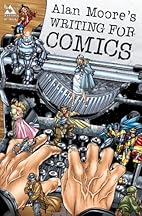
A not so useful guide to writing comics, which is more about how to write a story than it is a comic. Very thin book can be read in an hour or so.
Overall - Interesting but ultimately not very useful.
Stories in the stars: An atlas of constellations by Susanna Hislop

A very mixed bag of stories inspired by the constellations. Some draw heavily, or merely repeat, the Greek myths, some are flights of the writer’s fancy, some are to do with historical events. The book is useful however for having all the constellations illustrated in a way of being able to identify them.
Overall – Some stories are just bad, others are great so on the whole an average experience
Early science fiction tales by David Lear
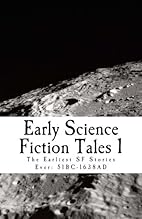
This collection of tales from early history by a mix of writers including Cicero, Lucian of Samasota, a couple of tales from the 1001 nights and the man in the Moone by Francis Godwin. It’s an interesting collection and the stories, being pre-science proper aren’t really science fiction, but use science fiction tropes such as journeys to the moon and time travel (the first ever time travel tale is included) the stories are interesting rather than absorbing and I wondered why the Godwin tale had not been modernised but the others had, probably due to the fact the others were in translation? It made the Godwin tale very hard to read though.
Overall – Interesting to see some tropes used BC
Neurogastronomy by Gordon Shepherd

Have you ever wondered what’s going on in your brain whilst you eat? If so then this book is for you. A fascinating look at food science from a neurological perspective, although there is a good overview of the physiology too. At times a little too esoteric for pop science but otherwise very well written it gives an overview of the relatively new science of neurogastronomy.
Overall – We eat therefore we think
making comics by Scott McCloud

If Understanding comics is the theory then this is the practise. Written for the comic creator it includes tips on storytelling and art. A little less interesting than the first but very useful if you ever wondered about the nuts and bolts of how to make a comic.
Overall – A good how to guide
Sequential art and graphic storytelling by Will Eisner
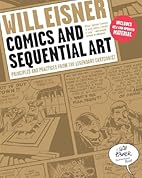

Theory & practise of making comics. Obviously McCloud has read these books and thought he could do better. And has. Coming to these after McCloud’s seems like a retrograde step. Although Eisner does cover topics in a different way, and some topics McCloud doesn’t and the books are useful, just a little less accessible than McCloud’s. If you were going to only read one I’d recommend McCloud’s, if you were going to read both I’d go for Eisner first then McCloud.
Overall – Good overview on the theory and practise of making comics.
the skeleton cupboard by Tanya Byron

This is an account of Byron’s years training to be a clinical psychologist with the toughest placements of her career. There are amalgamate stories carefully constructed around her experiences with each of the topics she deals with – grief and loss, child psychology, eating disorders, drug dependency, coping with dementia. Each story is compelling but there are a couple that will grab you by the heartstrings and give a great tug. The dementia chapter is simply heartbreaking. Byron is unflinching in self-regard, laying out many of the mistakes she made as she learned her job. There is a deep honesty here that is refreshing and it is good to see the people treated as humans not victims.
Overall – Beautifully written, often harrowing, bring a hankie
American Elsewhere by Robert Jackson Bennet

When ex-cop Mona Bright’s father dies she finds that she has just inherited her mother’s house in Wink, New Mexico. The only problem is, the town of Wink doesn’t exist on any map. She has a limited time to claim it and must perform some detective work to find it. She discovers that her mother, a basket case and suicide in Mona’s troubled childhood, used to work for a physics laboratory. When she arrives in Wink she finds that it is almost too good to be true, a perfect little town. But what is the secret at the heart of the town, why is the laboratory abandoned, what’s the significance of the lightning storm in the town’s history and why are so many of the townsfolk odd? This is a large book but doesn’t read like one. The central ‘mystery’ may have been drawn out a little too long but it isn’t a drag to get there. Bright is a fantastic protagonist and the book is chock full of great characters, scenes and ideas. A fascinating premise, a heavy dollop of weird, some truly disturbing imagery, this is truly memorable and I’ll be getting to Bennet’s other books directly.
Overall - Scientific and spooky, this is a fantastic book.
How to write everything by David Quantick

Listened to this on audio book which I think was the best decision. It’s a whirlwind tour of all and every possible writing job from poetry to writing sketches for TV comedy, writing novels to writing for newspapers. As a whirlwind tour it’s obviously not very detailed but Quantick’s soft West Country burr, gentle humour and pub storytelling style is always engaging. I’m just not sure if it’s useful. As an insider’s view of the writing industry it may be worth a look if you’ve never really thought about how all these different writing jobs really work. There’s also interviews with Quantick’s writing chums from the worlds of literature such as Ben Aaronovitch which are mildly interesting.
Overall – Light overview of the writing industry, If I’d read this rather than listened to it I reckon it would only have been an Average read.
The art of subtext by Charles Baxter
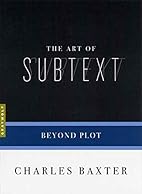
This is a collection of academic essays on subtext in literature, not a how to guide, which is slightly misleading in the way it’s packaged. However Baxter has some clever insights into various aspects of subtext and it’s worth a visit if literary criticism is your thing.
Overall – A deep pondering of the intricacies of what happens between the lines in good writing.
The consolations of the forest by Sylvain Tesson
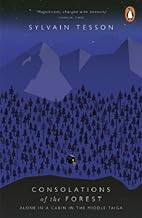
Silence falls from the sky in little white shavings. To be alone is to hear silence. A blast of wind; sleet muddles the view. I let out a scream. I open my arms, raise my face to the icy emptiness, and go back inside where it's warm.
Tesson, after a visit to Baikal, determines that he will lock himself away in a small wooden hut, on the shores of the lake, for six months, February to July. This is his edited journal, that he kept during those six months of mostly isolation, with crates of vodka, good cigars and lots of books as his main form of company. Along the way he makes friends with his nearest neighbours, who live many miles away, is given two dogs for companions and is visited by a variety of folk travelling across the lake. He endures extreme weather and reads, a lot.
His journal is, as you’d expect, by turns joyful, despairing, ecstatic, thoughtful and mindful. He ranges across the various topics suggested by the books he reads, the sights he sees, the natural world, fishing, the Russian way of life and its people and much more. The journal goes from the sublime to the ridiculous and back again, sometimes on the same page. Hunting is a way of life for his neighbours, but he never takes it up but there are some descriptions that may upset animal lovers. He makes friends with small birds and is fearful of the bears despite his Grizzly Adams existence.
Overall - This is deeply contemplative, poetic and wonderful book
Ricky Rouse has a gun by Jorg Tittel
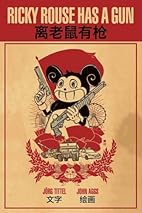
A graphic novel satire on East West relations, remakes, IPR and the modern world. Richard Rose is a deserter from the US army who travels across Asia and ends up in China working for an amusement park as Ricky Rouse, there is also Ronald Ruck, Rambi and Bumbo… A group of Western terrorists take the park hostage and Rouse, with help from a buddy security guard must save the day because the security forces make a hash of it. The format is Die Hard in an amusement park (a not so subtle dig at Hollywood remakes and endless sequels) and all that’s really missing is the Yippee Ki-Yay. It’s entertaining enough but a few sequences are a bit too hectic, a bit confusing on the eye and don’t quite work sequentially. The satire is not so subtle either.
Overall – Entertaining read. Treat it like an action blockbuster, be carried along but don’t think too deeply about it, and you’ll enjoy it.
No comments:
Post a Comment